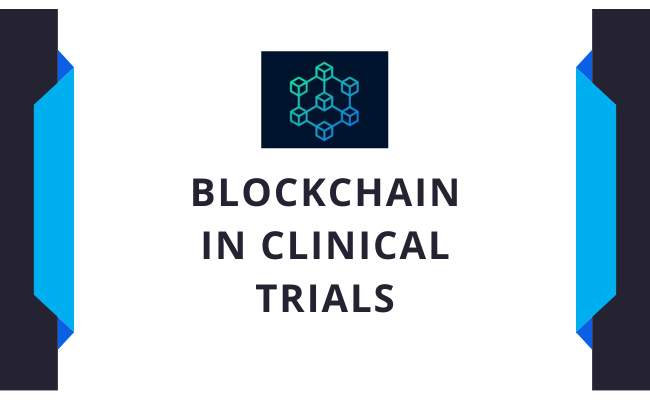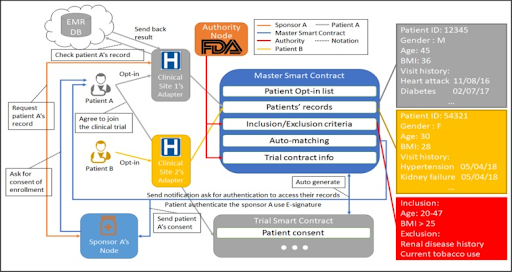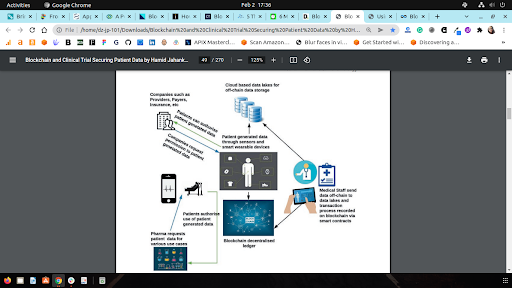Clinical trials are archaic and can be traced back to ancient times – 500 B.C. The reason for the conduct of clinical trials is the development of drugs, procedures, and devices to improve human health.
Since then, clinical trials have gone through many changes and updates on the standards that should be followed for ethics and how to carry out these trials.
Clinical trials face several challenges, including patient recruitment, trial complexity, costs, technology adoption, spiraling costs, and regulatory necessities.
Clinical trials are never easy – they are lengthy, complex, and require research centers to comply with rules and regulations of different standards.
Sometimes the quality of clinical research is undermined by severe misconduct, fraud, detrimental research practices, poor or selective reporting, lack of transparency, and errors.
To overcome these challenges, we need a technology that can offer a secure, transparent, and distributed datastore to increase the trustworthiness of clinical trials. That’s where Blockchain comes into play.
Workflow of Current Clinical Trials
But, can Blockchain improve trust in clinical trials? Let’s find out.
Blockchain: The Potential Game Changer
Blockchain is a peer-to-peer, decentralized, transparent, immutable, and distributed ledger that was initially applied in the financial industry.
The success of cryptocurrencies like bitcoin (a popular blockchain application) shows the security, robustness, and consensus mechanism provided in the blockchain system.
Blockchain can ensure the provenance of data and public auditability.
The blockchain system runs on users’ consent instead of third-party management.
Every blockchain transaction is distributedly stored in the “block” or node after validation by the user. To protect the user’s privacy, Blockchain offers a unique key pair (public and private key) to each user for identity verification.
Every transaction in the blockchain system has to be digitally signed by the sender’s private key, and other users in the Blockchain will see the public key instead of real identities.
Besides, all the transactions in the Blockchain can be audited by the users publicly, which solves the problem of transparency in clinical trials.
With Blockchain, the clinical trials’ quality is improved for both researchers and patient groups, as it secures data sharing and provides tools to guarantee privacy, respectively.
One can also add smart contracts to the blockchain systems for the self-executing, coded protocol between sender and receiver to regulate all the transactions.
Implementing Blockchain in Clinical Trials
To implement Blockchain in clinical trials, one can use Ethereum blockchain, an open-source platform with smart contracts feature to overcome clinical trial problems like recruitment of patients and checking clinical trial validity.
The creator node or authority has to start the blockchain system using a unique genesis block file so that other adapters can join the system using I.P. addresses and blockchain identifiers. While implementing Blockchain, the master smart contract automatically matches the potential trial subjects.
Apart from the master smart contract, multiple trial smart contracts are also used for trial management, enrollment of patients, and persistent monitoring for different clinical trials.
Only authorized users can execute some functionalities in the Blockchain’s smart contract.
Without the privilege, a user cannot access the data stored in the contract. The authorized node can also trace inconsistencies in the record and discover the reason behind them.
Until now, patients had no control over their data. However, as we look at the below-mentioned diagram, you can see that it’s the idea of patient-centric generated data, where patients are the center of deciding how their data can be used.
This diagram gives a clear image of patients being in control of their data and experiencing better outputs than before.
In the world of clinical research, transparency and accuracy of the data are key performance indicators (KPIs) to measure the effectiveness of trials. Hence Blockchain’s decentralized ledger has become the solution for these KPIs.
Blockchain Medical Solutions for Clinical Trials
As Blockchain is estimated to reach $3 billion in value by 2025 in the healthcare sector, clinical trials startups are trying to tune into the blockchain record-keeping system.
There are several ongoing projects in the market for clinical trials through Blockchain, but we will discuss a few of the most popular ones.
1. ClinTex
ClinTex goals are to offer data and blockchain services that have the pharmaceutical industry as a primary customer. The motivation behind ClinTex is to enhance the efficiency of clinical trials through technologies like machine learning, Blockchain, smart contracts, and predictive analysis.
Currently, clinical trials cost around $600,000 to $8M per day while significantly delaying the delivery of new medicines. ClinTex aims to reduce the cost of medicine while improving the speed of delivering new medicines for patients in need by bringing down the development costs for the pharmaceutical sector.
2. Innoplexus
Innoplexus are whizzes at Life Science research and offer tools that combine Blockchain with artificial intelligence. In addition, Innoplexus, with its 250 team members, provides drug and clinical trials solutions.
Innoplexus has a multiple-stage process to make research designs for the clients. For example, the A.I. mechanism has been specially designed for medical sciences and biology. On the other hand, blockchains are designed for clients who rely on distributed yet private communication.
Moreover, being sensitive to data, the Blockchain assures secure communication between selected participants by following GDPR compliance.
3. Triall
Triall has brought Web 3.0 to medical research. They aim to streamline medical trials to deliver pharmaceuticals faster. Triall has created a microservices network based on blockchain technology to build connections between data sources and processes in a clinical trial.
Blockchain in Supply Chain: A Transparent Prospect for Products
Triall has created a digital ecosystem with Blockchain integrated solutions to streamline and secure clinical trials for therapeutics and vaccines. The use of blockchain infrastructure makes data from clinical trials tamper-resistant. Triall aims to ensure clinical trial data to improve quality, efficiency, compliance, and trust for all the involved parties.
4. BioPharma Ledger
The core aim of BioPharma Ledger (a blockchain platform) is to streamline the research management processes. BioPharma Ledger operates every essential element of life sciences, entailing FDA submissions, patient data privacy, clinical trial management between providers and patients.
BioPharma Ledger simulates Ethereum smart contract capabilities by providing private blockchain solutions. It is aimed at the international market of clinical trials with its partners Cinlogix – the clinical trials originators in Asia, Europe, South America, and the USA.
5. Embleema
Embleema is another service that helps healthcare providers build clinical trials from scratch, including patient recruitments and research designs. Emleema has built a Virtual Study Suite (it’s proprietary) to create designs in a traceable, intuitive manner.
Emleema runs HIVE, a US FDA-approved information system for genomic information and big data. Embleema is a platform that collects, analyzes, and manages clinical and real-world data with complete control from the user, from the recruitment of patients to regulatory submissions. In addition, Embleema is a project that uses private blockchain technology capabilities without allocating a public digital asset.
Future of Clinical Trials with Blockchain
Blockchain technology has different advantages in data protection and security. Blockchain also offers the ability to bridge contrasting study sites, CROs, and system manufacturers.
And, if Blockchain is deployed in the context of clinical trials, it will help in developing transparent and highly trustable trials, enhance recruitment of patients, enable complete decentralization, support regulatory compliances, and facilitate integration.
Blockchain is an innovative solution for secured decentralized trials that enable robust governance and real-time decision-making despite geographical distances.
The proposed system can improve data integrity and accountability for the data exchange process while lowering the costs of transactions. Hence, it is being used by different companies to build secured data and service management systems in smart healthcare.
And if you are the one in the healthcare industry who wants blockchain-based clinical trials development, then you should go ahead and hire a blockchain developer.
Image Credit: Provided by the Author; Thank you!





















